
As many as 190,000 Filipinos live in Hong Kong as domestic workers, leaving everything behind in search of a better life for their loved ones back home.
“Hong Kong. It’s one of the places where many Filipinos head to for work. There are shopkeepers, waitresses, musicians, and some office workers, too, but most are domestic helpers—DH—like me. It’s all about luck when it comes to the kind of employer you land. Some are great, some are grouchy, and if you’re out of luck, you’ll end up with the worst of bosses—a sadist. But even if it’s a tiring job, it’s all okay in the end. Because no matter how you look at it, the money will always be better here than back home. Good thing is that I’m about to head home. It’s been a while since I last went home to the Philippines— six Christmases, six New Years, and six birthdays of my kids that I’ve missed. Thank God, I’m finally leaving this ‘hell of a paradise’.”
— Josie, played by actress Vilma Santos, in the 2000 Filipino film ‘Anak’ (Child)
Hong Kong: a frenetic, neon-clad harbor metropolis with an abundance of contrast and charm. Beneath the city’s pulse, and unbeknownst to the naked eye, lies a 190,000-strong diaspora of domestic helpers from the Philippines. They’re mostly women searching for better opportunities abroad in order to provide for their families—working as nannies, caregivers, and housekeepers.
Being a helper typically entails a twenty-four hour, six days a week live-in commitment to an employer. It’s a demanding line of work that takes an emotional toll, with luck playing an important role in determining one’s experience of being a helper. Helpers are vulnerable to unfair living conditions, compromised human rights, and, at times, abusive employers.
“One Way Ticket” is an unhindered retelling of this story. Originally collected in late 2015 and compiled into an 85 page book, the edited interviews below follow journeys of mixed emotions—mostly of sadness and longing for the company of loved ones, but also of simple joys and camaraderie with other helpers.
The bilingual publication intended to highlight the plight of domestic helpers and tell of their strife, tenacity, and sacrifice for loved ones they leave behind. In hindsight, “One Way Ticket” encapsulated the indomitable spirit of the modern-day Filipino overseas foreign worker, which long ago became vital to the social fabric of Hong Kong and many other cities around the world, with gratitude at its heart for the people who undertake such thankless roles.
Flor
3 Months
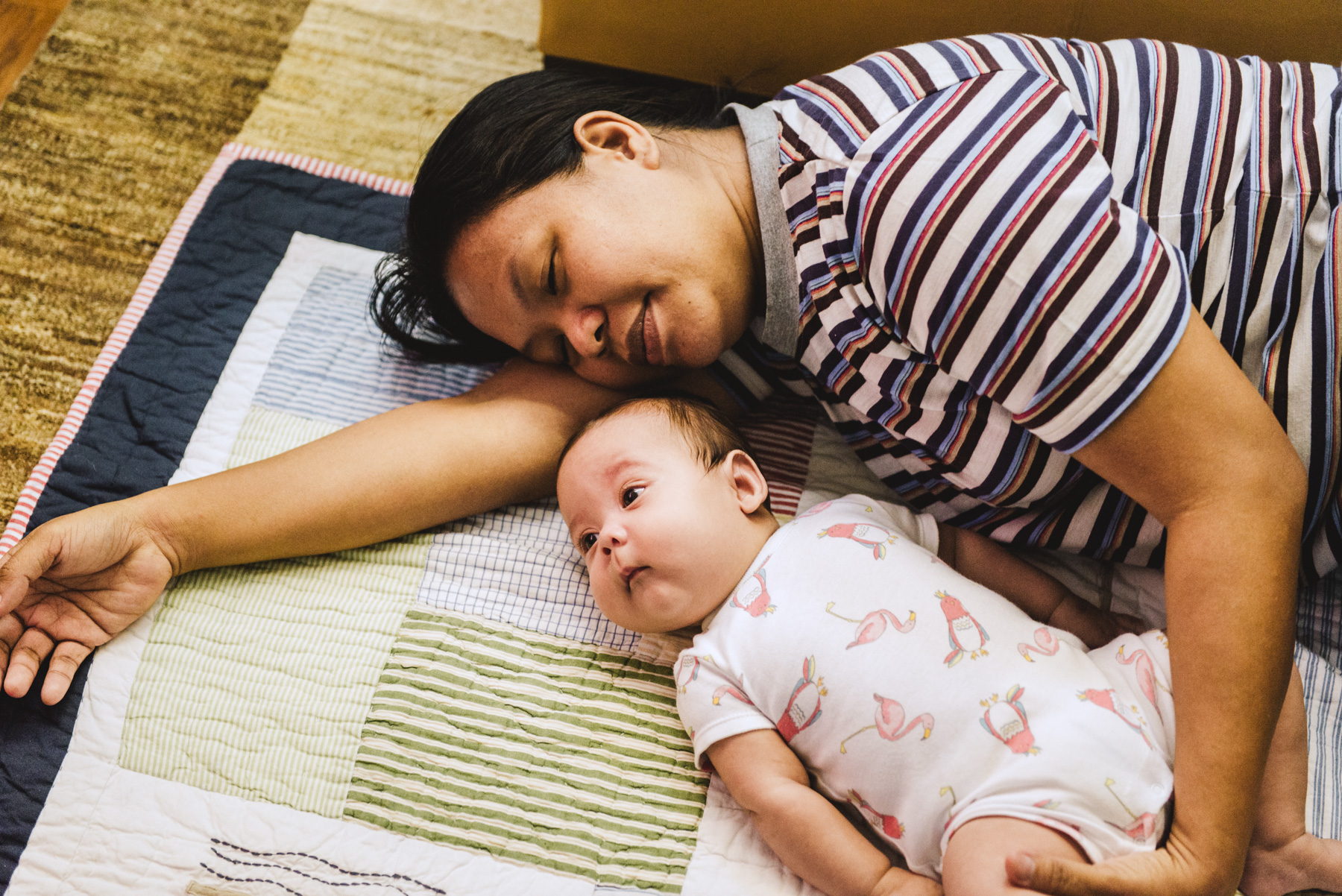
So my employer picked me up and held my passport from me. When I got there, the first impression I had towards my Chinese employer was that we really wouldn’t get along in the long run. I stayed in the New Territories. She told me in detail what my job was. I had a traumatic experience when I first went out with the family and their child was in the pram. When the MTR doors open there’s a gap, but I didn’t know how to work a pram at all; even if I have six kids, we never used a pram in the province.
There was only a second for the door to open then the alarm bells rang. Toot, toot, toot. I hadn’t even exited the train yet, and you know what? She started pointing at me and swearing at me, and at that time everyone was obviously already looking at me. I couldn’t manage to swallow my pride anymore. All of that happened just because I couldn’t manage to quickly exit the train with the pram. But isn’t it that at the MTR you’re not the only passenger? Some people are exiting, some people are entering. I guess she was just concerned that the wheels of the pram might get stuck in the gap, but then I explained to her that I’m not used to managing a pram. That was the first experience wherein I got terrified of her.
*
I’m not used to living a life like that. I’ve never looked at myself so small in my entire life but I accepted it because that’s just the way it is. That’s when I realized and grew to understand how it really is like to work here. You don’t look at yourself as someone who’s finished college. You swallow all your pride. You would think that working here would be great because of all the posts you see on Facebook, and you’ll think that it’s amazing as long as you do your job and make your money.
*
You know that feeling when you see that your family’s online, you’d feel a sense of happiness? And when they’re not online, all the worries start to pour in. It’s like you’ll really go crazy. That’s when I understood what homesickness was. It was making me crazy. When I was still about to leave the Philippines for the first time, I told my family, “Mm, there’s always Skype, and there’s Facebook!” Why not go overseas and seek a better life, right? All I had to think about was that there was no money here at home and I had to make a living.
But when you’d truly have feelings of sadness from being away from your family, you’d say that “Who cares if all we’d eat is salt? As long as we’re all together.” It really is a different feeling being so far away from them, and if you’re not strong, you’d seriously go mental. That’s when you’d start to feel nervous, which can spark a nervous breakdown and that feeling that you’re being eaten up… because what really creates homesickness is not you, but your employer if that’s how you get treated. It’s because you have no one to turn to here—all you’ve got is yourself.



Your intention in the beginning would be to work because you needed the money. However, you won’t feel a sense of worth with your job if you don’t love what you do, right? You’ll end up just going back home because you don’t like it here. How will you succeed in your objective to work because you need the money if you’re not passionate about your job? I left the Philippines because I was forced to… because I need the money.
*
You’ll make your money, but you need to love your job for you to make your money. The biggest thing now is that I feel like I’ve grown to become attached to the kids. It’s like I couldn’t just leave them by themselves. Because there are others there who take care of kids but when time’s up and work’s finished, that’s it. When they can’t do it anymore they don’t come to work.
But that’s not me. I really try to get to know the kids, learn what their weaknesses and strengths are, and how to better take care of them. Even ma’am and sir don’t know their daughter as well as I do. It’s only my scent that she knows best and I’m the only one who can nurse her. Something like that. Sometimes I joke around with ma’am… “Ma’am, she knows my scent better than yours.”
*
It’s always up to luck as to what kind of employer you get. Some domestic helpers I know have gone through far worse things. A woman I started with here in Hong Kong who was larger than me has now lost so much weight. That’s why it’s no joke when you have a parent that’s an OFW (Overseas Filipino Worker). It’s not always true that they’re rich or that they’re always happy. No. I always tell my kids that every peso that they get is equivalent to my blood, my sweat, my fatigue, hardships, hunger, lack of sleep—everything. That’s our life here.
On their days off, some OFWs leave the house bare-faced with no make-up on because sometimes their employer prohibits them to wear make-up. When they’re out, that’s when they transform. They wear lipstick then take photos and selfies. That’s their joy. It’s because living a life where you’re an OFW your days off are the only time you can truly say … “that’s me”. You’ve got a hold on your own time. No one’s holding you back. But when it’s time to head back to your employer’s home, your life’s different once again. You become a different person.
OFWs—they’re like celebrities. You have to be sharp, you have to learn and work with your boss’ moods, you have to learn how to get along with them and how to act at work—like an actress.
But deep inside, that’s not you. You only do that for the sake of your job because you need to earn the money.
Lucy
4 Years
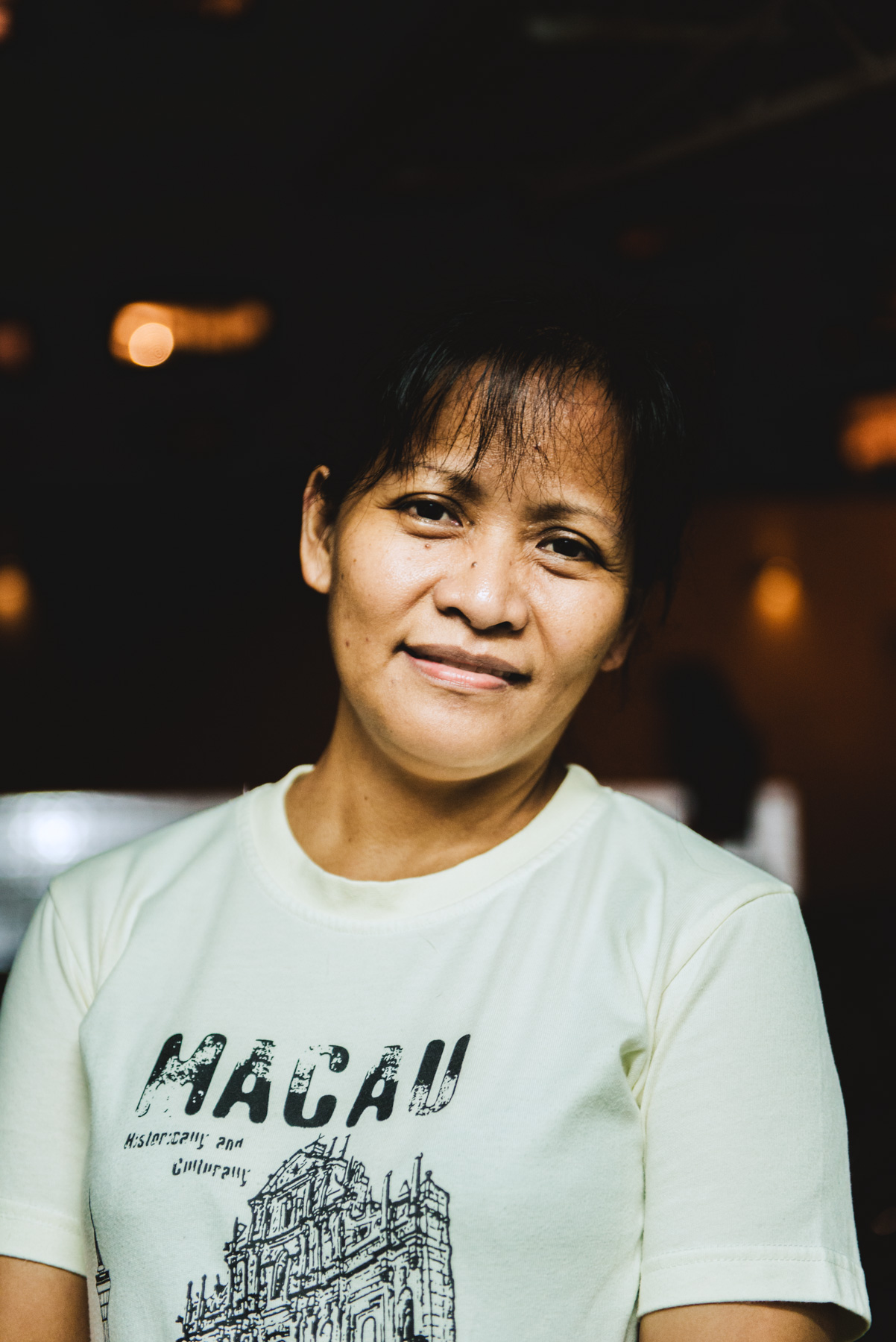
I find it quite enjoyable here in Hong Kong and I’ve been here for four years. It’s exciting. I don’t get sad often. Flor even told me, “Lucy, how come you’re here but you have no husband nor any kids?” But that’s the point: others come here even when they have partners so why wouldn’t I? I’ve always wanted to go abroad because I wanted to go through a new life experience—how exciting it is, how sad it will get, and how happy it might get. You feel everything. In my case, I don’t get homesick.
*
It’s fun taking care of kids—it’s fun seeing them happy and watching them grow up. When I see them grow up I feel that it’s as if it’s okay that I don’t have a family of my own… that it’s quite okay to raise kids. I’ve learned a lot about myself, not like at the start when I had a shy personality. Back then my mother would scold me and I’d cry, which wouldn’t happen now. Now I’m a fighter. If I need to reason out to someone, I won’t hesitate to do it.
Life’s short and you have to enjoy it. Because when you always think, “Oh, it’s so hard, everything’s so hard”… No, because hurdles are always going to be part of life. Like the time when my mother got sick back home, who shouldered the expenses? Wasn’t it me? But what if I had stayed in Manila the entire time?
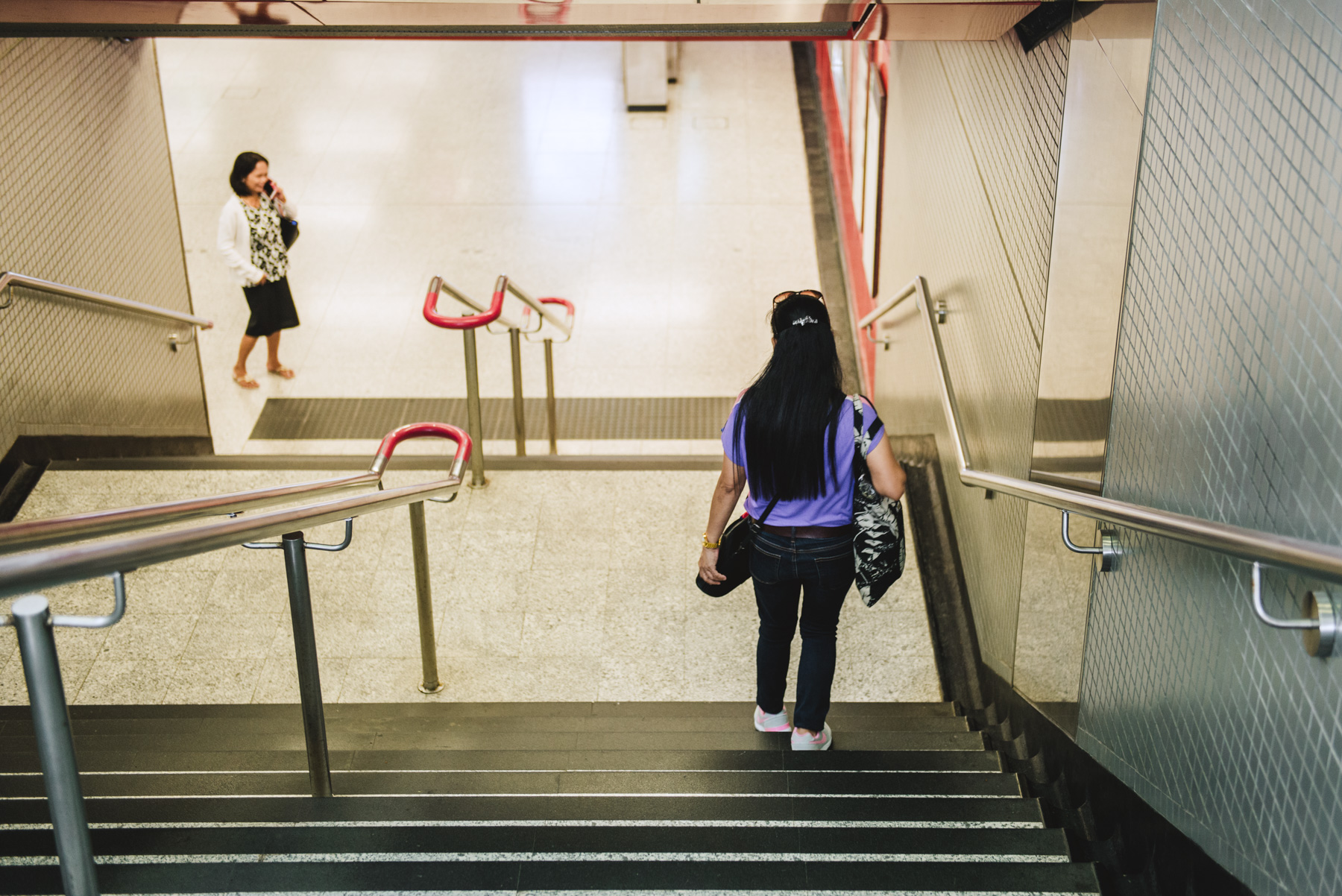
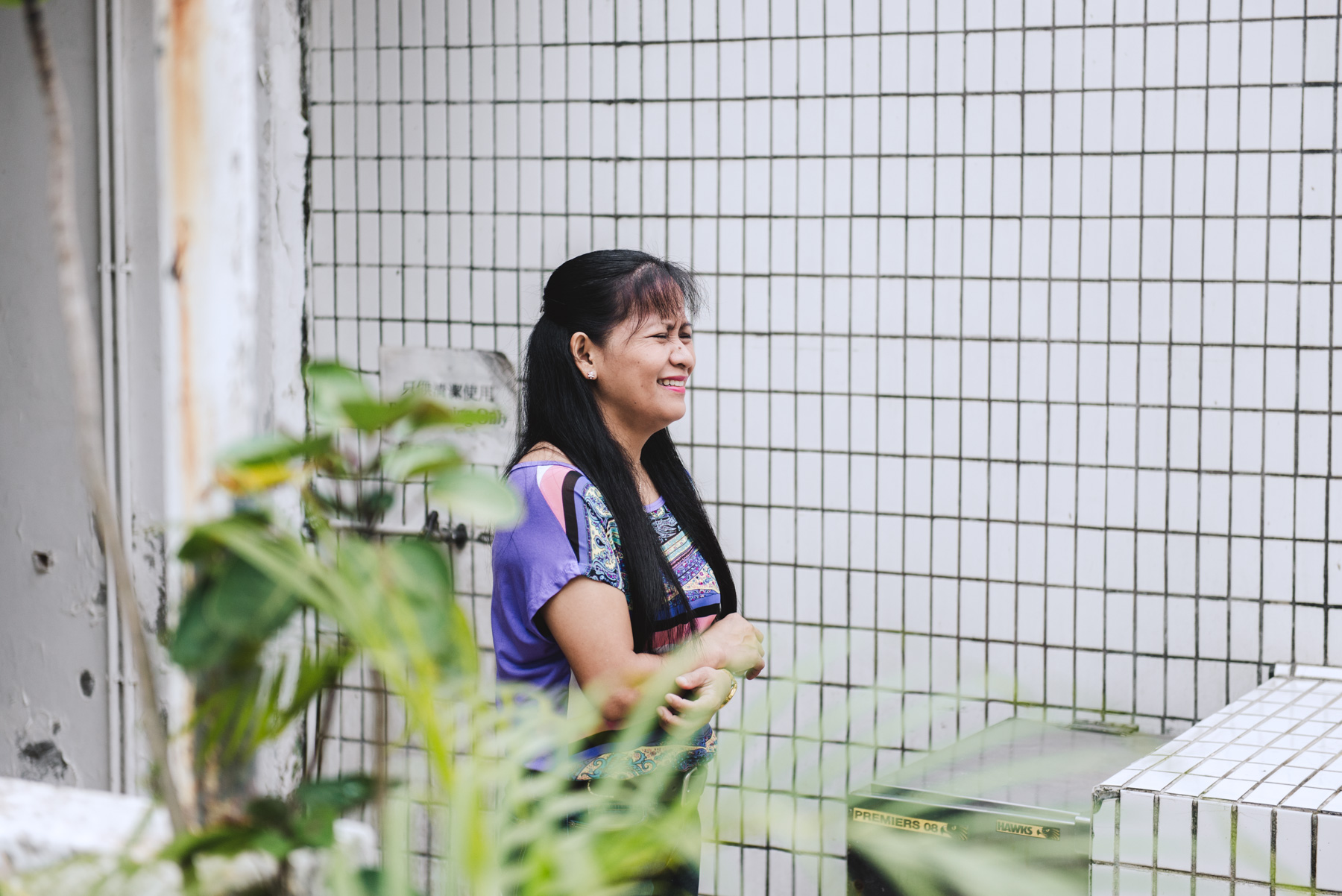
Then after a few months, it was my father who got sick. My job really helps, and that’s why I’m proud of it and what I do. It doesn’t matter what it is—as long as I don’t hurt others or step on other people. I walk the streets with my head held high because I haven’t stepped on anyone. What’s important is that one has fear in God.
*
From the beginning I’ve always wanted to experience the life here in Hong Kong. I heard that the pay’s big, and my thoughts then were, “If I were to stay in the Philippines, even if I have no family of my own, where would I get my income from?” I mean, there’s plenty in Manila but I wanted something different. At least I was able to experience living in the Middle East, now it was time for something different… It was my turn to try Asia.
I won’t go further way from home and now at least I’m closer to my siblings back home, than before. That’s why I said to myself that I’ll try it out in Hong Kong. I don’t really get homesick because I’m busy with church and I do my praise and worship there. I feel that when you do that, you get to express everything. You get to pray to the Lord, “Lord, give me my strength, give me everything, all the blessings.” Blessings or no blessings, the gratitude remains.
Avelina
30 Years

I’ve been here for thirty years. I was twenty-nine when I came here. My biggest achievement is my grandchildren—six grandchildren from two kids.
*
When it was just us—us first-comers thirty years ago—I think there were only about 35,000 domestic helpers here. That was 1986, and the number just kept growing. The salary then was low, but its value was high. Now the salary’s high, but its value is low.
*
Of course I’ve experienced everything: happiness, sadness, life’s ups and its downs—but, I’m happy because I
have six grandchildren. That’s what always comes to mind: my children. My children and my grandchildren. I’m happy here in Hong Kong but the thing is I’m getting old. I’ll turn 61 next year and it might be time to head home for good. 61 years old and I’m still working!
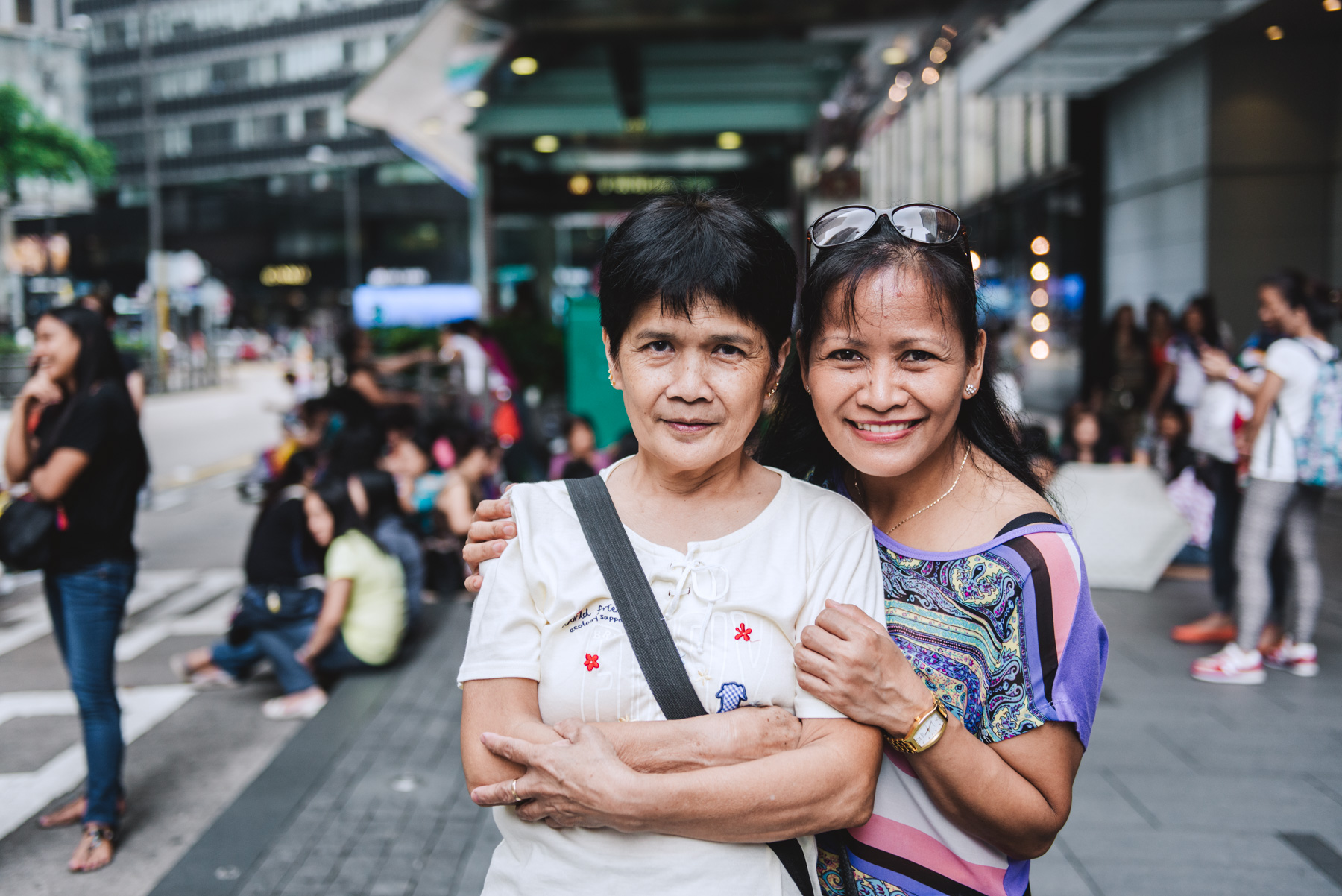
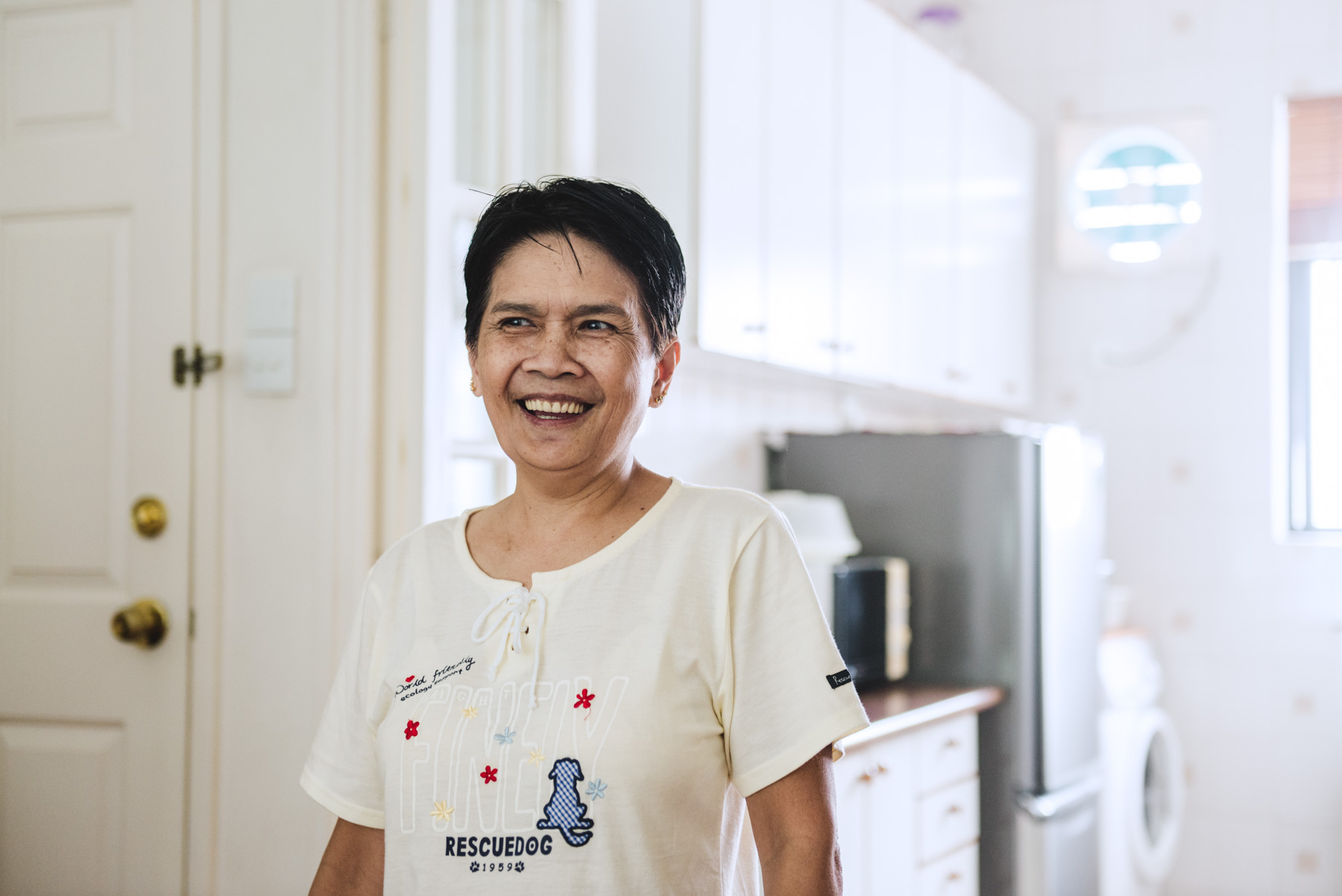
They’re now 37 and 32. The eldest has a ballet school and the youngest is in London and getting married. She’s the one I raised. They’re not mean, unlike other kids who hurt their helpers even at a young age. Not them—they’re good.
The respect they have for me in this house is quite big. The only thing is that my employer’s so frugal when it comes to my food. Unlike in other homes where you can eat whatever you want, here it just depends on what she brings home—sometimes it’s not much, sometimes it’s a lot.
*
The government was better before, especially when it comes to the laws set upon us domestic helpers. It was easier. When you got terminated, you could stay until you found another employer unlike now, where you’re given only two weeks and if you don’t find a new employer then you have to go home. The laws were better then, when Hong Kong was still run by the British.
*
This is the life for us who are less fortunate. You have to be aspiring and persevering— it’s all encompassing.
To find out more about Overseas Filipino Workers, consider watching Anak (2000), Sunday Beauty Queen (2016),The Helper (2017), or YAYA (2018)
To see more of Marco’s work visit his website or follow him on Instagram.


























